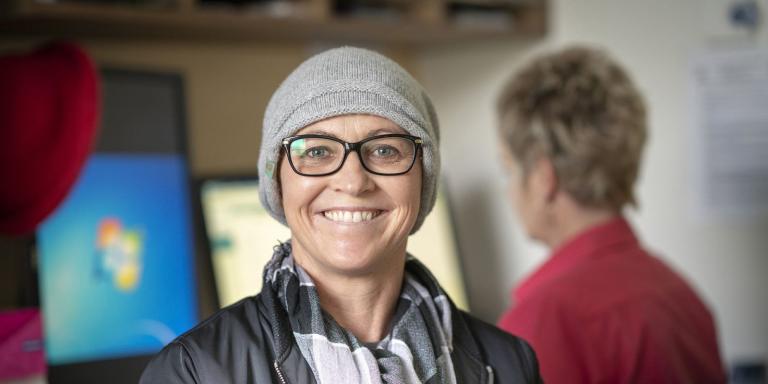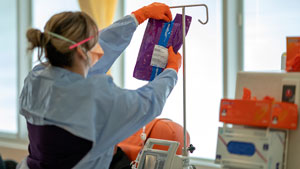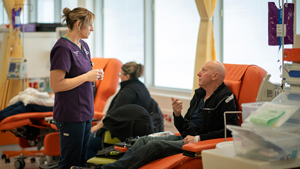
Chemotherapy
Northern Cancer Service

What is Chemotherapy?
Chemotherapy is an anti-cancer treatment. Because cancer cells are faulty, they divide more rapidly than most regular cells. Chemotherapy works by destroying all cells that are in the process of dividing. This makes chemotherapy a very effective treatment for cancer.
Chemotherapy is used to treat a range of different types of cancer and can be administered in a range of different forms, including:
- as a cream applied to the skin
- as a capsule or tablets to be taken orally
- as an injection
- as an infusion into a vein or
- administered directly into the tumour.
Chemotherapy may be given as a single drug, as a combination of drugs and or in combination with Radiation Therapy. The duration of chemotherapy treatment will depend on the type and stage of a person’s cancer, other health conditions a person might have and or their personal wishes and potential side effects. Sometimes a vascular access device may be used to protect veins when intravenous treatment is required over longer periods.
You will have regular appointments with your Medical Oncologist during and shortly after your treatment. It’s important to discuss any questions or concerns you may have about your treatment with your oncologists. It may be helpful to make a list of questions, keep a notebook or bring a support person who can also listen or help you ask questions.
What to expect on your visit and coming for treatment
Coming for treatment
Before coming to treatment, you will attend a Pre-Chemotherapy Clinic, where we will discuss what you can expect when coming to treatment, any pre-medications you will need to take and any pre-blood tests you will need to have, as well as ways to manage the side effects of your specific treatment.
If you are sick it’s important to call us before you come into treatment, as we may need to help you arrange a medical review.
What to expect
On the day of your treatment please check in at the front desk and we will collect you from the waiting room.
You will be provided with a hospital ID sticker, you can expect to be asked to identify yourself several times through-out your treatment (even when we know you well). This is a safety precaution to make sure the right person is getting the right treatment.
We encourage people to bring something to read ie. book, magazine, iPad, Kindle or anything you enjoy doing while sitting in the treatment chair.
You are welcome to bring food and drinks, we will provide you with lunch and a drink, we also have volunteers who come to the clinic offering drinks and treats.
It’s always important to let us know if you feel unwell at any stage during your treatment.
Frequently asked questions about treatment
How often will I have to come for my treatment?
Chemotherapy and other drug treatment times vary depending on the drugs being given and whether they are being given in addition to another form of cancer treatment. Treatment may incorporate one day or consecutive days per month, week, fortnight or every three weeks, with each "cycle" repeating for a set number of courses.
All patients coming for cancer treatment will be provided with a schedule of their visit times.
How long does each treatment take?
Depending on the drug/s being given, your visit to the clinic may vary from a few minutes to several hours. We will always give you the best estimate of the time-frame for your chemotherapy or treatment when you are booked in.
Can people come to treatment with me?
Yes, you are welcome to bring 1 – 2 people to treatment with you. Due to space and safety in the clinic, we try to keep this at no more than 2 visitors. The chemotherapy unit is not well set up for children, if you need to have children with you or visiting, please discuss this with the nursing staff in the clinic before your treatment.
Do I take my usual medications?
Occasionally you might be asked not to take a specific drug on the day of treatment due to possible interactions with your planned treatment. Your Oncologist will need to know what medications you are taking, including any over the counter supplements or herbal remedies. If you stop, start or change the dose of any medication, supplement or herbal remedies please let staff know prior to treatment.
specific drug on the day of treatment due to possible interactions with your planned treatment. Your Oncologist will need to know what medications you are taking, including any over the counter supplements or herbal remedies. If you stop, start or change the dose of any medication, supplement or herbal remedies please let staff know prior to treatment.
Can I eat before treatment?
It’s okay to eat and drink as you normally would on the day of treatment. Some people find it helpful to avoid hot/spicy foods and alcohol around their treatment days to reduce the risk of heartburn/ gut irritation.
If you are going to consume alcohol while you are receiving cancer treatment it is important to discuss this with your oncologist.
How is chemotherapy treatment given?
Although some chemotherapy is available in tablet form, most chemotherapy is via a peripheral cannula (needle in the vein). Some people will need to have an additional device inserted into their vein, which may stay in place for many weeks or years, depending on their treatment. These are known as vascular access devices. Your oncologist and treating team will discuss what is right for you when planning your treatment.
Will I be sick after treatment?
Not all chemotherapy drugs cause nausea, however, aiming for prevention is helpful by taking your anti-nausea medication as prescribed and keeping up your fluids before and after treatment. There is also a range of additional anti-sickness medications which can be used prior, during and after your treatment to reduce nausea and vomiting.
Can I drive after treatment?
We recommend for your first treatment to have a designated driver and see how you go before you plan to drive yourself for future treatments. Sometimes extra drugs are given as part of your treatment before the chemotherapy. This is to reduce the chances of a reaction to the drug/s. Some of these "pre-medication" drugs may cause drowsiness and slow your response times.
After treatment at home
Patients receiving treatment in our day units are given education and support about managing at home after treatment. The nurses will provide information about any potential side effects or symptoms which may occur and how to manage these.
You may also be provided with medication to take home after your treatment to prevent or manage side effects. The nurses will also answer any questions related to your treatment and what to do if you become unwell.
An emergency letter and wallet card are given to you when you start treatment, if you do need to seek urgent medical assistance, it’s important to share these with the health care team treating you.
If you develop any of the following symptoms:
- A temperature of 38oC or above
(or 37.5oC if you live further than thirty minutes’ drive from the hospital) - Chills, shivers or shakes
- Feel short of breath
- Become unwell.
It is important to seek urgent medical advice or go to your nearest emergency department or Dial 000 if ambulance assistance is required.
Patients having certain types of chemotherapy will be provided with additional information about ‘chemotherapy precautions’ at home to reduce the risk of exposure to the people they live with.
This information is also available online via the eviQ website
Side effects
Each person will experience their treatment differently, however, because chemotherapy works by destroying cells as they divide, many other cells in the body are also impacted by treatment. This is what causes many of the side effects of chemotherapy, these can include:
- Feeling tired / lack of energy.
- Lack of appetite.
- Nausea and vomiting.
- Sore mouth.
- Constipation or diarrhoea.
- Skin and nail changes.
- Bleeding problems.
- Anaemia (low red blood cells).
- Nerve and muscle effects.
There are many ways that your oncology team will work to try and reduce the side effects of chemotherapy. These include discussing things like mouth care and keeping well-hydrated, along with the use of some other medications like anti-nausea tablets and steroids for example. Because each person is different and their treatment will vary, we will work with each patient and their family to help develop a plan of care which is best suited to them.
Managing the side effects of chemotherapy Brochure eviQ
Frequently Asked Questions
Below is a list of questions and the answers that people commonly ask about their chemotherapy. We encourage patients and their families to ask as many questions as they need to get a good understanding of what to expect.
Some patients say it can be helpful to keep a diary, notebook or document on your phone or tablet with questions you think of at home or when speaking to friends and family. We are happy to help work through these questions when you are next in the clinic.
Can I hold my children, grandchildren and pets?
Yes, it is safe to continue your contact with your family and pets as you normally would. Some chemotherapy can lower your immune system, this will make you more susceptible to picking up things like viruses and infections, which can make you very sick when your immune system is not working properly. It’s always good to practice regular hand washing and reduce contact with people who are unwell due to infections or viruses until they are better. Its always good to talk to the nurses and doctors providing your treatment about how to reduce infection risks.
Will my hair fall out?
Not everyone who has cancer treatment loses their hair.
Hair loss, thinning and changes to the look and feel of your hair do happen with some specific chemotherapy drugs. When you initially discuss your treatment with your doctor and the rest of the team, we will talk to you about your specific treatment. If it does occur it’s important to know that hair loss is temporary and there are a range of resources and supports available to you and your family to guide you through the experience.
Can I dye my hair?
Yes, patients having cancer treatment can dye their hair. Some people prefer a plant-based dye because it may be softer on their skin.
Can I still work?
It is okay for people to continue working whilst receiving chemotherapy. It is helpful to be aware that tiredness and fatigue are common side-effects of cancer treatment. Many patients report that reduced hours/ flexible work arrangements during treatment are helpful. Speaking with your oncologist about your specific treatment and work is important. They will also be able to provide you with a medical certificate for your treatment.
We also have Social Workers and Centrelink Services available to assist with financial considerations during and after your treatment.
Can I have sex?
Yes, sex and intimacy are a very important part of many people’s relationships. This does not need to be stopped because a person has cancer. Some treatments can require additional precautions such as forms of birth control or protection. It's good to speak with your oncologist when planning your treatment about sex and intimacy.
Some people may experience changes in their ‘sex drive’ related to various cancer treatments. This is common and is temporary for most people. There is a range of supports and resources available, a good place to start is speaking with your oncologist or your specialist cancer nurse.
Can I go swimming?
Yes, you can generally go swimming while having cancer treatment. It’s important to keep some dressings or devices dry. Before going swimming talk to your treating cancer nurse about what will work best for you.
How will I know if my treatment is working?
You will have regular blood tests and scans, as well as assessments by your oncologist during and after your treatment. If you are experiencing any new symptoms or you feel unsure if your treatment is working, it's important to talk about this with your oncologist.
If symptoms come on very suddenly or you become very unwell during or shortly after cancer treatment, it is important to go to your closest emergency department for assessment. It may be that you have an infection, virus or side effect to your treatment. Becoming unwell during or shortly after treatment does not necessarily mean your treatment is not working.
More information
There are a range of supports and resources available in each of our clinic’s and online, below are some useful web resources we recommend to patients:
